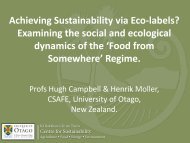Book of Abstract (incl. addendum) - IFSA symposium 2012
Book of Abstract (incl. addendum) - IFSA symposium 2012
Book of Abstract (incl. addendum) - IFSA symposium 2012
Create successful ePaper yourself
Turn your PDF publications into a flip-book with our unique Google optimized e-Paper software.
Workshop 1.2 Family Farms as Educational Farms – Possibilities and Perspectives<br />
Learning on the farm – definitions <strong>of</strong> basic concepts<br />
Johanna Schockemöhle, Hans-Heiner Heuser and Ulrich Hampll<br />
Compentence Centre <strong>of</strong> Regional Learning, University <strong>of</strong> Vechta, Germany<br />
Jschockemoehle@ispa.uni-vechta.de<br />
The increasing application <strong>of</strong> learning on the farm in theory and in practice has led to an equally<br />
increasing variety <strong>of</strong> concepts and interpretations <strong>of</strong> concepts. This contribution represents an attempt<br />
to clarify the terminology used when we talk about learning on the farm in order to facilitate the<br />
advancing exchange and cooperations on international level both in theory and in practice. To start<br />
with, a definition is suggested for the central term 'farm education'. Additionally, definitions are given<br />
for two further concepts which are commonly used in Germany and have the potential to encourage<br />
considerations on a clear terminology: 'farm as a learning place' and 'farm pedagogics'. The definitions<br />
have been developed by the author in close cooperation with the German Federal Association 'The<br />
farm as a Place <strong>of</strong> Learning' and are open to discussion.<br />
Designing community supported agriculture projects as living learning<br />
environments – a dialogical approach to child education and farming<br />
Tobias Hartkemeyer<br />
Organic Agricultural Sciences, University <strong>of</strong> Kassel, Germany<br />
Csa@h<strong>of</strong>pente.de<br />
Supported by the German Fund for Environment (www.dbu.de), an innovative intergenerational<br />
education program was initiated on the community supported agriculture farm “H<strong>of</strong> Pente“ in<br />
Germany. It focuses on connecting consumers with the social, economic and ecological aspect <strong>of</strong><br />
production and consumption by turning the farm into an intergenerational learning environment that<br />
produces food for a regional community.<br />
Green Pedagogy and Research at Educational Farms<br />
Renate Mayer, Claudia Plank and Bettina Plank<br />
Agricultural Research and Education Centre Raumberg-Gumpenstein, Austria<br />
Renate.Mayer@raumberg-gumpenstein.at<br />
In todays’ community, target group oriented teaching <strong>of</strong> knowledge for all levels <strong>of</strong> education is vital.<br />
This counts especially for green disciplines. This kind <strong>of</strong> knowledge transfer is important in the area <strong>of</strong><br />
agriculture. The population is dependent on sustainable primary production, even if the number <strong>of</strong><br />
workers in this sector decreases. The “research workshop farm” <strong>of</strong>fers the access to diverse<br />
occupations, but it also creates a reference to environmental and natural circuits. Themed to the motto<br />
“research to touch” complex knowledge is transferred in a playful way. Green pedagogy <strong>incl</strong>udes<br />
nature, environmental protection and economy. Also the interaction between nature and agriculture is<br />
important whereby sustainability serves as a main concept for the future.<br />
Agrarian education contains the topics nature and animal protection, agrarian circuits and the<br />
coverage <strong>of</strong> sustainable sources <strong>of</strong> income. Farmers gain additional qualifications in multidisciplinary<br />
topics. They develop the economical, ecological and social interaction between agricultural production<br />
and a natural and cultivated landscape. The communication <strong>of</strong> knowledge from research contributes to<br />
the development <strong>of</strong> interdisciplinary innovative networks. Methods for innovative know how transfer<br />
are connected to theory and practice. Authentic Learning is a possibility for promoting the cooperation<br />
between practitioners, teachers and students. There are many fields <strong>of</strong> occupation on educational farms.<br />
The development <strong>of</strong> competences <strong>of</strong> young people is depending on the activities they carry out. Fun,<br />
play and adventure are very important when working with younger target groups in such “green<br />
24











